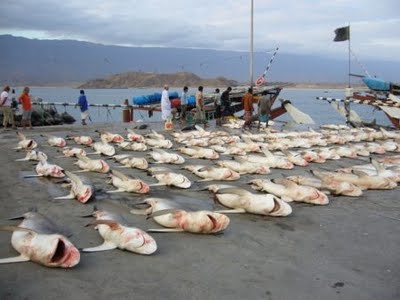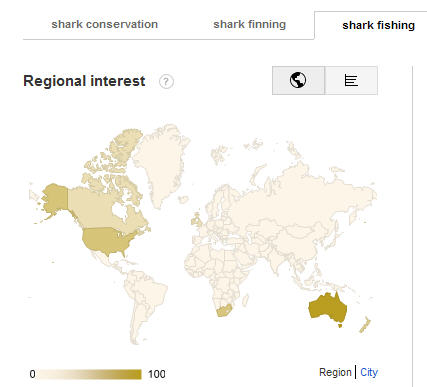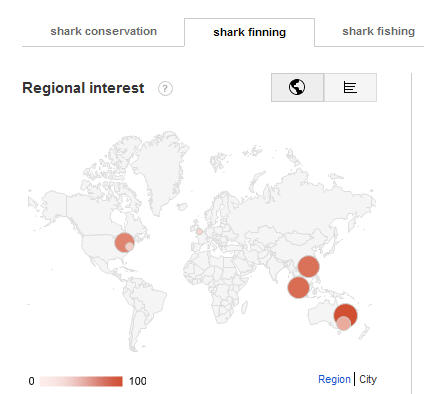Google Searches and Patterns in Interest in Shark Conservation, Shark Finning, and Shark Fishing,
In the last year there has been considerable controversy regarding overfishing of sharks and the practice of shark finning. These were, and remain, hot fishery conservation topics. To put this into some perspective, Beel used various Google tools to examine three phrases: “shark conservation”, ” shark finning”, and “shark fishing.” Beel examined these phrases over the long term using Google Ngram Viewer- which looks at the frequency of words or phrases in published books (here, those published in English), and over the shorter term using Google Trends- which looks at the frequency of words or phrases in internet search queries.
Please friends, allow Beel to present the results of these inquiries.
First, Beel presents results from a Google Ngram Viewer search for these phrases, from 1800 to 2000- the period of record (see below). The phrase “shark fishing” increased in frequency from about 1840 through the 1920’s and then remained more-or-less constant since that year. Note, though, that this includes discussions of “let’s go shark fishing” in the early years, with a transition to conservation concerns about shark fishing in later years.
Shark conservation and shark finning are nowhere near as frequently mentioned in books during this period.
Next, Beel repeated this analysis, omitting shark fishing, so as to get a better picture of the frequency with which shark conservation and shark finning occurred (see below).
Beel asks that you note the abbreviated time scale- from 1960 to 2000. Shark conservation and shark finning were not on anyone’s radar prior to the 1960s. Since the mid-1980s, both phrases, especially shark conservation, have been increasingly mentioned in books.
Now friends, please examine a more contemporary measure of interest in these three phrases based on Google Trends.
This figure (above) shows a decline in internet search volume for shark fishing, from 2005 through 2012, with an obvious seasonal pattern. Much of this search volume reflects queries about shark fishing regulations and policy, overfishing, etc., so these queries are basically related to conservation, as opposed to queries for information on catching sharks for food, fun, and profit (but see farther below!). Search volume for “shark conservation” and “shark finning” is much smaller in volume and trends are difficult to discern.
Again, Beel repeated the analysis omitting shark fishing. The results are shown below. In the past few years there has been increased interest in both terms, especially in shark finning. These results are consistent with those above. Since the 1960s there has been a general increase in interest in shark fishing (policy and regulation) and shark conservation based on Google Ngram Viewer results. In the past several years shark finning, as a conservation issue, has become increasingly prominent, as shown in the Google Trends results.
Looking at geographic patterns in search volume for these three phrases is really interesting. First, examine the results for shark conservation.
These are English language searches. Per capita, Australians searched this topic most frequently, followed by the Americans and Brits. Surprisingly, Canadians, Kiwis, and South Africans had very low interest, as measured by search volume.
Now, examine results for shark fishing.
The pattern is basically similar as for shark conservation, except for the South Africans, who showed interest in this topic.
Finally, the really fun stuff. If we look at shark finning, on a regional (= country-wide) scale, we find this topic is of interest to the Canadians. Shark finning is also of interest to the Australians, Americans, and Brits (below).
We can also look at this based on the relative volume of searches coming from various cities (below).
Ah, this is the money shot! There is a lot of interest in shark finning in Toronto, then New York City, in the western hemisphere. There is a lot of interest in Brisbane and Sydney, Australia. There is a some interest in London, Great Britain.
But what’s up in Asia? There is considerable search volume for shark finning originating in Singapore and Hong Kong. Are the queries out of these two cities related to conservation? Beel thinks maybe not. The searches coming out of Singapore and Hong Kong are unquestionably related to the international trade in shark fins, which is centered in those cities. Interesting!
Overall, per capita, the Australians demonstrate the greatest interest in shark conservation (including shark finning and shark fishing). Americans show, consistently, the second greatest overall interest in shark conservation. Interest in Canada, South Africa, and Great Britian appears to be very dependent on the precise wording or phrase examined. Surprisingly, the Kiwis do not show up.









